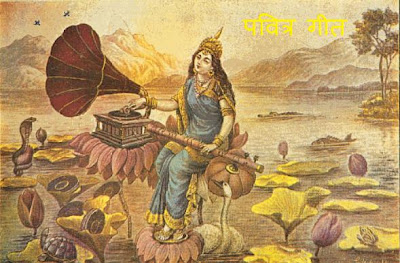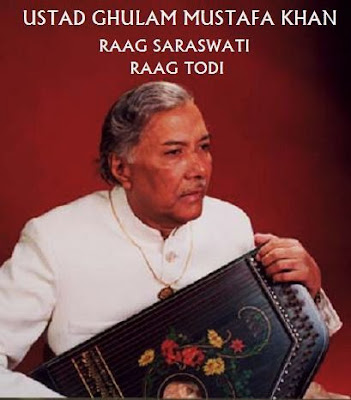
01. Saraswati
- Vilambit Ektal: More man bhaye
- Drut Trital: Sagan aaye
- Vilambit Khyal: Nisdin tumharo dhyan [ektal]
- Drut Khyal: Hamari Jaye Kahiye [tintal]
Endowed with an exceptionally melodious and sensitively adaptable voice, Ghulam Mustafa Khan‘s music gives witness to the rigorous traditional training that he received from his distinguished gurus. He hails from a family steeped in North Indian Classical vocal music culture, his forefathers being some of the most prized court musicians honoured and celebrated by the Kings and Maharajas in a musical lineage that goes back to more than 150 years.i had some other posts in mind before we touched upon Ghulam Mustafa Khan & these two encroyably head-swirling renditions from 1975, but because they're so near & dear to my heart at the moment, i share them now. this musique has been my food for the past several weeks & i been utterly losing myself in these transcendental sounds a couple o' thymes each day. if you've enjoyed any of the hindustani vocal musique posted in the past or were innearested but didn't quite know where to sink your feet, i simply insist that you hear this. likely my favorite recordings in this domain at the moment & after all the disorienting weirdness from various locales, this is what centers me most. able to hold mood-altering notes for an eternity & unfurl superlectric taans, the virtuosity he displays here glistens like the iridescent plumes of some spectral space peacock whilst spatially enhancing the room & expanding my meristem. both ragas are sung in praise of saraswati, the hindu goddess of musique & learning, who's depicted just above entrancing flora & fauna with her trusty gramophone. 320 hearts & hugs to Ambrose Bierce. yr aim is true
Ghulam Mustafa Khan has brought these traditions into the present with great effect, and added his own personal traits. Born over seven decades ago, on March 3, 1931, in the Badayun city of Uttar Pradesh, Ghulam Mustafa Khan was initiated into music by his father, Ustad Waris Hussain Khan. Later he was groomed under Ustad Fida Hussain Khan, and then later his son Nissar Hussain Khan.
Ghulam Mustafa Khan belongs to an illustrious school of music known as ‘Sahaswan Rampur Gharana‘. This Gharana has produced an abundance of khayal singers since the time of its founder Ustad Inayat Hussain Khan (1849-1919).
Khayal, in Urdu meaning imagination, is the most popular genre of North Indian classical vocal music, designed to give the singer optimum scope for improvisation. Originating in the courts of the Moghul emperors as a less rigid alternative to the Dhrupad style, it has evolved into a remarkably flexible form that allows an artist’s individuality considerable rein. Even within the past five decades the form has undergone many changes, and the tradition of innovation continues through pioneers like Ghulam Mustafa Khan.
Khayal has several schools following different style traditions. Most of these Gharanas have been built around certain families or specific locations like Gwalior and Rampur. Gharanas traditionally followed the Guru-Shishya system of instruction in which direct, one-on-one teaching and personal supervision meant a clearer and therefore deeper understanding, of both the traditions of that Gharana, of the raga, and of the role of a particular style in exploring and presenting that raga. As Inayat Hussain, the founder of the gharana, hailed from Sahaswan and was trained and lived in Rampur, this gharana came to be called Rampur Sahaswan.
It’s always been a struggle for khayal singers to establish themselves on the world music scene, because of the barrier of language. In fact, the lyrical content of the khayal while certainly enhancing the beauty of the presentation is regarded as secondary to the ability of the performer to improvise within the framework of the specific raga. The emphasis on lyrical content varies from artist to artist, many of the texts of khayal are written in an ancient form of Hindi known as Brij Bhasha. Khayal has also had a profound influence on instrumental music. Many instrumentalists point out that Indian music IS vocal music, and that the instrument should sing in the style of khayal.
Ghulam Mustafa Khan’s contribution goes beyond his own performance. He has trained and moulded some of India’s finest film singers including Manna Dey, Sonu Nigam and Hariharan. He was awarded the Padma Shree in 1991 by the Indian Government in recognition of his service to Indian music heritage.

No comments:
Post a Comment